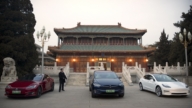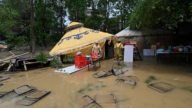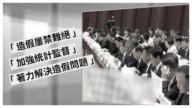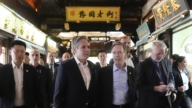【新唐人2012年8月27日訊】中國大陸出口增長顯著放緩的同時,中共國務院總理溫家寶日前到廣東省進行考察,他指出,下半年經濟「穩增長」的難度較大,而敦促廣東要「千方百計穩定外需」。有經濟學者認為,「穩定外需」沒有可行性,當局對目前中國經濟下行已經無力回天。
24和25號兩天,溫家寶在廣東省委書記汪洋的陪同下,在廣州、佛山和東莞等地,就當前經濟走勢,特別是穩定外需、加快外貿轉型升級進行了調研。
溫家寶表示,從廣東省的新出口訂單指數等先行指標來看,出口仍然面臨較多困難和不確定性,實現下半年經濟「穩增長」的難度較大。
時事評論專家傑森認爲,曾經作爲拉動中國經濟增長的三駕馬車之一的出口,目前已經變成了拖累經濟發展的因素。
時事評論專家傑森:「廣東那邊,像東莞等等這些地方,是中國目前面臨的經濟問題的核心展現的地方。像東莞這樣子的國際工廠的代表性地點,經濟幾乎是處於無增長的情況。」
資料顯示,中國大陸經濟增速已經連續5個季度放緩,今年第2季度的GDP增長率更是只有7.6%,是2009年第一季度以來第一次低於8%。踏入7月份後,沿海主要省市的出口增速也明顯放緩。
溫家寶敦促廣東要「千方百計穩定外需」,並強調「穩增長」是中央下半年經濟工作重點任務,要進一步加大宏觀調控的力度。
對於溫家寶要「穩定外需」的提法,北京師範大學MBA導師段紹譯感到非常意外,因為外需不可能在調控範圍之內。
傑森也認爲,出口下滑給中國經濟帶來了很大壓力,不過「穩定外需」沒有可操作性,只是形式上為廣東省糟糕的經濟打打氣而已。
傑森:「穩出口也就是接著讓出口這輛馬車起作用,但是我覺得這個話完全是一個口號性的話,沒有具體可執行性。換句話說,可能也展現出溫家寶在中國經濟目前面臨這樣的情況的一種回天無力的感覺。」
據《自由亞洲電臺》報導,2012年上半年,大陸企業倒閉率從過去的每年3%-5%上升到8%-10%,包括電子、紡織、製衣和玩具等行業。中國作為跨國公司加工工業基地的地位已經開始全面動搖,曾經的經濟發展龍頭—-珠三角更是面臨著製造業大逃離。
最新公布的製造業採購經理指數創下9個月新低,也顯示出大陸製造業活動持續處於萎縮狀態。
傑森:「中共目前唯一的辦法就是用政府消費的形式推動所謂的內需,用政府投資的方式推動所謂的投資,其結果都是資金的低效率使用。因爲政府投資是整個資金鏈最低效率的消費形式,其實已經是變成了像整個一個人將死的時候,整個機體是靠注射營養液讓他活下去,維持心跳這樣一個狀態。本身他自身的動力已經喪失殆盡了。」
近期各地方政府已經開始出臺經濟刺激計劃。據大陸媒體初步統計,在過去的50天裡,已經公布的地方投資計劃涉及金額大約有7萬億元,遠遠超出金融危機時的「4萬億」計劃。
美國華府中國問題專家石藏山向《大紀元》新聞網指出,中國經濟蕭條嚴重已經讓當局感到危機,無奈投資刺激成爲唯一的選擇。不過更大規模的刺激經濟,將導致比上次「4萬億」刺激計劃更嚴重的後果,通脹將再次迅速上升。對於中國經濟來說,只是「飲鴆止渴」。
採訪/劉惠 編輯/李明飛 後製/周天
Beijing Regime Helpless to Tackle China’s Bad Economy
China has seen a significant slump in export growth.
Chinese Communist Party (CCP) Premier Wen Jiabao
recently traveled to inspect Guangdong Province.
Wen Jiabao highlighted the hardship in stabilizing
economic growth for the second half of the year.
Wen has urged Guangdong authorities to “assure
demand from overseas markets by all means”.
Economists have negated the feasibility
of “stabilizing foreign demand”.
They concluded that the CCP regime has been completely
helpless in tackling China’s economic slowdown.
On August 24 and 25, Wen Jiabao, accompanied by
Guangdong CCP Chief Wang Yang, inspected Guangdong.
Wen visited the cities of Guangzhou, Foshan and Dongguan.
He stressed stabilizing overseas market demand and
speeding up of export sector’s structural improvement.
Wen Jiabao said that Guangdong’s new export
orders index revealed a tough export situation.
The goal of “stabilizing economic growth"
in the second half of 2012 would be difficult to achieve, Wen Jiabao claimed.
Critic Jason Ma states that China’s export was one
of the three major engines of economic growth.
However, it has now become a burden
to the country’s economic development.
Jason Ma: “Regions in Guangdong, like Dongguan,
fully embody the current economic problems in China.
These places typically centralize international plants,
but the economic growth is almost zero.”
Public data show that China’s economy has
slowed down for the fifth consecutive quarter.
China’s GDP growth rate during the second quarter of 2012
was only 7.6%, which is the first time below 8% since 2009.
Major coastal provinces and cities have seen
a significant slump in export growth since July.
Wen Jiabao has urged Guangdong CCP authorities to “do
everything possible to stabilize overseas market demand."
Wen said that “stabilizing economic growth”
is the priority in the second half of 2012.
The regime shall tighten macro-economic
regulations, according to Wen.
What Wen Jiabao discussed has surprised Duan Shaoyi,
an MBA mentor at Beijing Normal University.
Duan remarked that demand in overseas
markets is off the radar for the CCP regime.
Jason Ma adds that the decline in export
has put China in a very stressful situation.
It is not feasible to “stabilize overseas purchases”.
Wen’s approach is only a slogan that boosts
morale against Guangdong’s bad economy.
Jason Ma: “Prioritizing export, that is,
making this engine continue to function.
But I think the talk is a pure slogan, without feasibility.
In other words, it may indicate Wen Jiabao’s helpless
feeling in the face of China’s current economy.”
Radio Free Asia reported that in the first half of 2012,
China’s business failure rate rose to 8%~10%
The previous annual figure was 3% ~5%.
The involved sectors include electronics,
textiles, garment and toy manufacturing.
The position of China as a manufacturing base
for multinational companies has become shaky.
The Pearl River Delta, once heading China’s economy,
is now facing a big withdrawal from the manufacturing sector.
The latest PMI hit a nine-month low, showing
that China’s manufacturing continues to shrink.
Jason Ma: “Now the only way for the CCP authorities
is to use government consumption to fuel domestic demand.
To use government investment to promote investment.
All these approaches have inefficiently used money.
In terms of the entire capital chain, government investment
is the least efficient way of consumption.
It is like a dying person who is kept alive by injecting
nutrient solutions to maintain his heartbeat.
But his own energy has been completely lost.”
Local CCP authorities have recently
initiated plans to boost the economy.
China’s media reported that in the last 50 days,
announced investment plans involve about RMB 7 Trillion.
This figure far exceeds the RMB 4 Trillion
used in the financial crisis.
Shi Cangshan, expert on China issues,
commented to The Epoch Times.
The severity of China’s economic slump
has placed the CCP regime into crisis.
However, investment has become the regime’s
only option for an economic stimulus plan.
Shi Cangshan warns there would be a worse aftermath if
more than RMB 4-Trillion is used as an economic stimulus.
Inflation would be once again quickly raised.
Shi Cangshan remarks that for China’s economy, this
approach is equal to “drinking poison to quench thirst”.



























